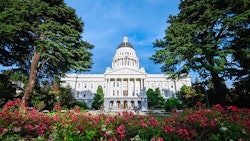
The Massachusetts House of Representatives has released its version of a police reform bill, which references how tax dollars from the state’s Marijuana Regulation Fund are used for police training.
Shaleen Title, commissioner of the Massachusetts Cannabis Control Commission, tweeted about that version of the bill and a subsequent amendment that would in addition, but not instead, direct tax dollars to restorative justice and other measures.
People were heard: @RepLizMiranda has filed an important amendment (Amendment 86 to H. 4860) that would direct an equal or greater amount of cannabis tax revenue to programming for restorative justice, jail diversion, workforce development, + technical assistance. Good first step https://t.co/k1xTo6mIk7
— Shaleen Title (@shaleentitle) July 21, 2020
Cannabis Business Times and Cannabis Dispensary spoke with Kobie Evans, co-owner of Pure Oasis in Boston, about how cannabis tax dollars are used in Massachusetts.
He said the decision to direct tax dollars to police training looked like a compromise to try to “appease both sides. But I think that it still represents the fact that a lot of people, especially lawmakers, are somewhat tone-deaf as it relates to racial injustice and over-policing—and the disparity that exists between people of color that are engaged by the police and our white counterparts who receive far less scrutiny and far less apprehension."
Cannabis is often used as probable cause, legitimately or illegitimately, for police to interact with people of color, he said.
Related: Oregon Cannabis Association Demands Portland Cannabis Tax Not Be Used on Law Enforcement
U.S. Census data shows that Black people make up about 25% of Boston's population, but Suffolk County District Attorney Rachael Rollins shared in a recent webinar hosted by the Marijuana Policy Project that Black drivers account for 70% of total stops in the city.
Cannabis legalization can help address police reform, Evans said, by “eliminating the smell of weed as a gateway to someone dying at the hands of the police."
Evans applauded that the movement for racial justice in 2020 involves numerous people and groups working to advance conversations. “I think that as there is more attention brought to the matter and some of this stuff is decloaked, then sometimes that's enough to sanitize the language and to clean it up,” he said.
The police reform bill will be debated on July 22, according to State Rep. Liz Miranda (D).
Today we begin debate on H4860, on Policing in a Massachusetts. Beginning at 11am. To follow along: https://t.co/ZRbA3iiUlZ pic.twitter.com/B7vqTDaine
— Representative Liz Miranda (@RepLizMiranda) July 22, 2020
In related news, the Boston Cannabis Board will meet July 22 to adopt rules and regulations. City Councilor Lydia Edwards’ office provided a statement to CBT and CD.
Part of the statement, addressing the current draft rules and regulations, reads:
“The number one concern that I have heard from people that are trying to get into the industry is that they don’t know how long the approval process is going to take. These rules and regulations do nothing to fix that problem. The final regulations should establish a clear timeline from the time an application is filed until the end of the process.”
Edwards also argues that there also needs to be more transparency with regard to host community agreements in the city. She writes: “The agreements need to be reviewed and executed by the BCB during their public review of a complete application. Negotiating HCAs behind closed doors after a license has been issued and not establishing a timeline for execution will continue the status quo of inequity and opaqueness.”
Edwards also tweeted her thoughts on the rules and regulations.
Thread: On Wednesday the Boston Cannabis Board will hold a meeting to adopt its rules and regulations. Major changes to the draft rules and regs are needed to ensure we will have an equitable marijuana industry in Boston. #bospoli #mapoli
— Lydia Edwards (@LydiaMEdwards) July 20, 2020
The board meeting will take place at 1 p.m. on July 22. It is open to the public, but the comment period has already closed.
Correction (July 24, 2020, 1:40 p.m. ET): An earlier version of this story stated that the House version of the police reform bill proposes directing cannabis tax dollars to police training. The state already uses cannabis tax dollars for police training.


























